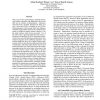Free Online Productivity Tools
i2Speak
i2Symbol
i2OCR
iTex2Img
iWeb2Print
iWeb2Shot
i2Type
iPdf2Split
iPdf2Merge
i2Bopomofo
i2Arabic
i2Style
i2Image
i2PDF
iLatex2Rtf
Sci2ools
110
Voted
ECSQARU
2007
Springer
2007
Springer
Towards an Extensible Argumentation System
Many types of inter-agent dialogue, including information seeking, negotiation and deliberation can be fruitfully seen as varieties of argumentation. Argumentation frameworks, originally introduced by Dung, provide a powerful tool for evaluating the sets of conflicting arguments which emerge from such dialogues. Originally argumentation frameworks considered arguments as completely abstract entities related by a single attack relation, which always succeeded. Use of the frameworks in practical application such as law, edemocracy and medicine, however, motivated a distinction between successful and unsuccessful attacks, determined by properties of the conflicting arguments. This remains insufficient, however, to capture a range of phenomena which can arise from procedural and contextual considerations, and which require that the success of an attack depend not only on the properties of the conflicting arguments but also on the nature of the attack or the context in which it is made...
Argumentation Frameworks | ECSQARU 2007 | Frameworks Considered Arguments | Single Attack Relation |
Related Content
| Added | 07 Jun 2010 |
| Updated | 07 Jun 2010 |
| Type | Conference |
| Year | 2007 |
| Where | ECSQARU |
| Authors | Adam Zachary Wyner, Trevor J. M. Bench-Capon |
Comments (0)

